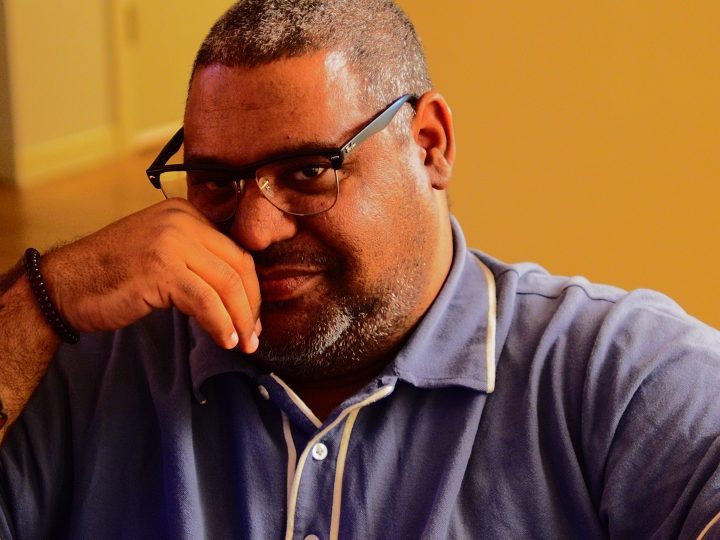Chris Abani is an acclaimed novelist, poet, essayist, screenwriter, and playwright. Born to an Igbo father and English mother, Abani grew up in Afikpo, Nigeria. His experiences in his home country inspire much of Abani’s work, equally informed by his research into African poetics, twentieth century Anglophone literature, Yoruba and Igbo philosophy and religion, and many other areas of study.
Abani’s latest work is a book of poetry entitled Smoking the Bible, in which he illustrates the connective geography between harm, regret, and release, as his poems move through landscapes of Nigeria, the Midwestern United States, adulthood, and childhood.
Q&A with Pádraig Ó Tuama.
Smoking the Bible is an arresting collection of poems thick with feeling, shaped by Abani’s astounding command of form and metaphor. These poems reveal the personal story of two brothers—one elegizing the other—and the larger story of a man in exile: exile of geography, culture, and memory. What we experience in this emotionally generous collection is a deep spiritual reckoning that draws on ancient African traditions of belief, and an intellectual vivacity drawing on various wisdom literatures and traditions.
Chris Abani’s fiction includes The Secret History of Las Vegas (Penguin 2014), nominated for the Hurston/Wright 2015 Legacy Award, Song For Night (2007), The Virgin of Flames (2007), Becoming Abigail (2006), GraceLand (2004), and Masters of the Board (1985). His poetry collections are Smoking the Bible (2022), Sanctificum (2010), There Are No Names for Red (2010), Feed Me The Sun – Collected Long Poems (2010), Hands Washing Water (2006), Dog Woman (2004), Daphne’s Lot (2003), and Kalakuta Republic (2001). Poet Kwame Dawes has noted that “Abani’s line has a sharp precision that turns a scream into a line of memorable lyric music without losing the emotion and force.”
Through his TED Talks, public speaking, and essays, Abani is known as an international voice on humanitarianism, art, ethics, and our shared political responsibility. His critical and personal essays have been featured in books on art and photography, as well as Witness, Parkett, The New York Times, O Magazine, and Bomb.
He is the recipient of a Guggenheim Fellowship, the PEN/Hemingway Award for Graceland, the PEN Beyond the Margins Award, the Hurston Wright Award, and a Lannan Literary Fellowship, among many honors. His work has been translated into French, Italian, Spanish, German, Swedish, Romanian, Hebrew, Macedonian, Ukrainian, Portuguese, Dutch, Bosnian, and Serbian.
Abani’s many research interests include African Poetics, World Literature, 20th Century Anglophone Literature, African Presences in Medieval and Renaissance Culture, The Living Architecture of Cities, West African Music, Postcolonial and Transnational Theory, Robotics and Consciousness, Yoruba and Igbo Philosophy, and Religion.
Abani is currently a Board of Trustees Professor of English at Northwestern University. He lives in Chicago.
Pádraig Ó Tuama, our Q&A moderator for the evening, is a poet and theologian whose work centers around themes of language, power, conflict and religion. For Ó Tuama, religion, conflict, power and poetry all circle around language, that original sacrament. Working fluently on the page and in public, he is a compelling poet and skilled speaker, teacher and group worker. He presents Poetry Unbound with On Being Studios. Ó Tuama’s published work incorporates poetry (Readings from the Book of Exile; Sorry for your Troubles, Feed the Beast), prose (In The Shelter) and theology (Daily Prayer; Borders & Belonging, with Glenn Jordan) and anthologies: Poetry Unbound; 50 Poems to Open Your World. Work is featured or forthcoming in Poetry Ireland Review, Academy of American Poets, Raidio Teilifís Éireann’s Poem of the Week, Post Road, IMAGE, Dumbo Feather, Gutter, America, and New England Review. He has broadcasted, recited and been interviewed many times on RTÉ, BBC (Radio 4, Radios Scotland, Wales and N. Ireland) and Radio National (Australia).

